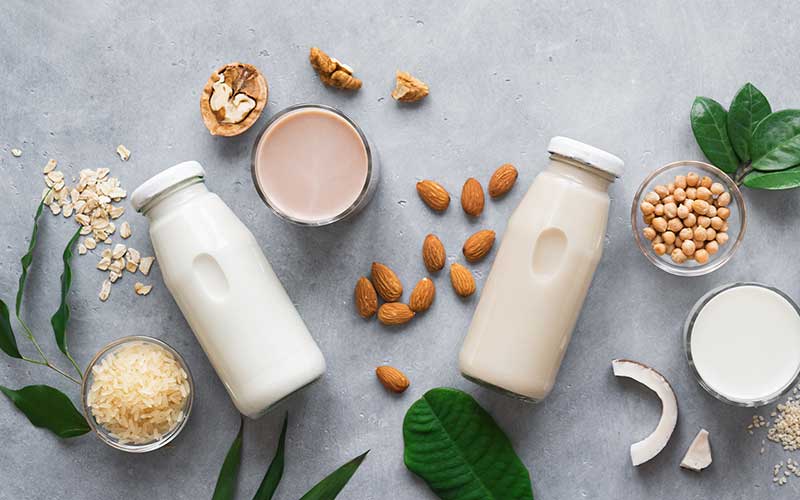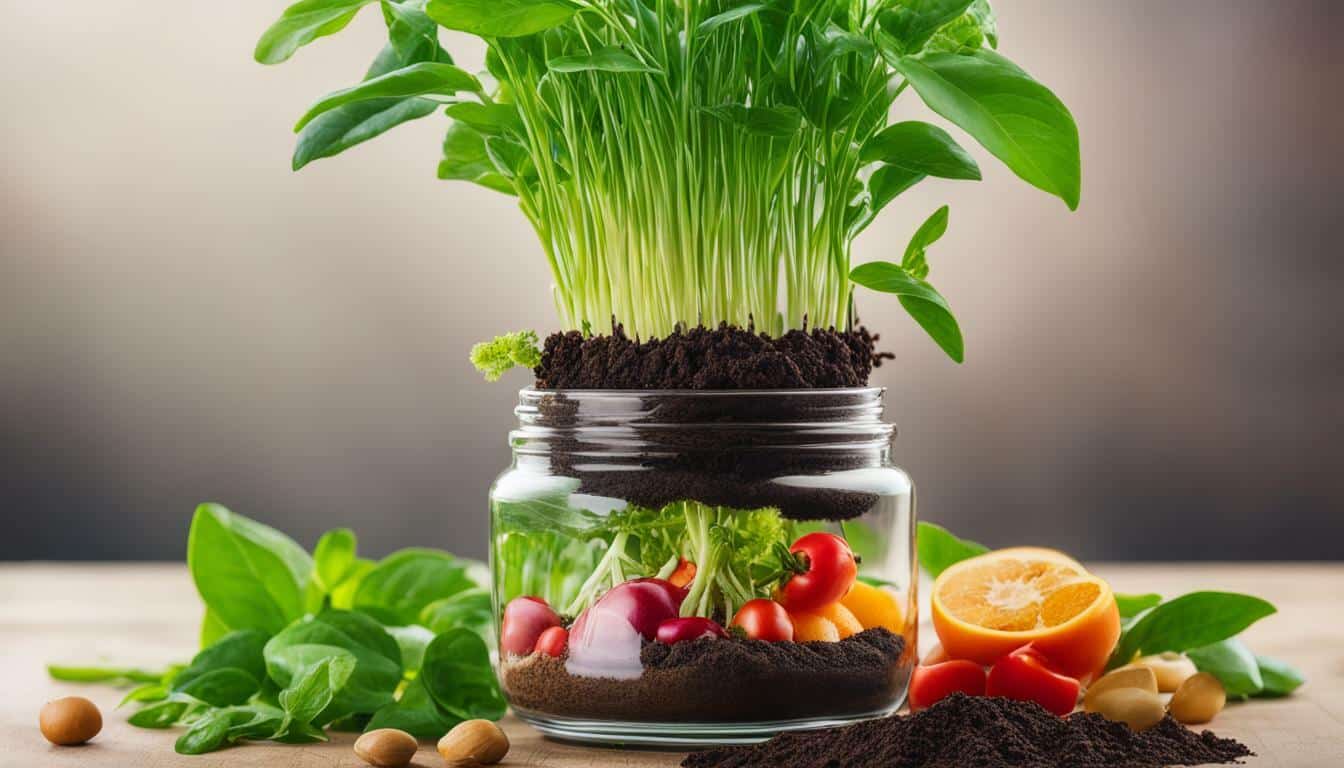Plant-based diets have gained immense popularity in recent years due to their numerous health benefits. One of the key advantages of plant-based diets is the abundance of plant proteins. However, plant protein absorption remains a topic of debate among nutritionists and health enthusiasts. While some claim that plant proteins are less bioavailable, others advocate that plant proteins are just as effective as animal proteins.
In this section, we will delve into the world of plant protein absorption. We will explore the benefits of plant proteins, how they compare to animal proteins, and delve into the factors that affect their absorption in the body. By the end of this section, you will have a comprehensive understanding of plant protein bioavailability and how to maximize the absorption of plant proteins for optimal health.
Key Takeaways
- Plant protein absorption is a crucial component of a balanced diet.
- Plant protein bioavailability is determined by various factors such as gut health, cooking methods, and the type of plant protein source.
- Plant proteins are an excellent alternative for individuals seeking sustainable, healthy protein sources.
- Maximizing plant protein absorption is possible through various strategies and tips such as combining foods and enhancing plant protein digestion.
- Plant protein bioavailability can be optimized for improved overall health.
Plant Protein vs. Animal Protein: Understanding the Differences
When it comes to protein, people generally think of meat, poultry, fish, and dairy products as primary sources. However, plant-based protein is also an excellent way to meet protein requirements. Unlike animal proteins, plant proteins are more difficult for our bodies to digest and absorb.
Our bodies are not equipped to break down the cell walls of plants, which contain a tough fiber called cellulose. This means the nutrients in plant proteins are not as easily accessible as those in animal proteins. However, this also means that the breakdown of plant-based proteins is slower and steadier, providing a longer sustained energy boost.
Another key difference between plant and animal proteins is the varying amino acid profiles they offer. While animal proteins typically contain all 9 essential amino acids that our body cannot produce, plant proteins may be missing a few. However, by consuming a diverse range of plant proteins, we can still easily obtain all the essential amino acids necessary for protein synthesis.
Plant Protein Digestion: How It Works
When we consume plant proteins, our digestive system needs to break down the tough cell walls and remove the fiber to access the nutrients within. This process is aided by digestive enzymes produced by the pancreas and small intestine.
Once the proteins are broken down into their component amino acids, they are absorbed into the bloodstream and transported to cells throughout the body where they are used for energy and tissue repair.
Overall, while plant-based protein digestion may be more difficult for our bodies, the benefits of incorporating plant protein into our diets are numerous and well worth it for a balanced diet.
Maximizing Plant Protein Absorption: Strategies and Tips
Plant-based protein sources provide valuable nutrients and can be an excellent addition to a balanced diet. However, not all plant proteins are created equal, and some may be more difficult for the body to absorb than others. Fortunately, there are several strategies you can use to maximize the absorption of plant proteins and ensure that your body derives the maximum benefit from these valuable nutrients. Here are some tips to enhance plant protein uptake:
Combine Plant Proteins with Complementary Foods
To enhance the absorption of plant proteins, pair them with complementary foods that contain amino acids that complement those found in the plant protein. For example, beans can be paired with rice or quinoa to create a complete protein source. Similarly, nut butters can be combined with whole-wheat bread to create a protein-packed snack. Adding healthy fats, such as avocado or olive oil, can also improve the absorption of plant proteins.
Optimize Cooking Methods
Some cooking methods can enhance the bioavailability of plant proteins. For example, soaking beans overnight and cooking them slowly can help break down complex sugars and make the proteins more digestible. Fermenting or sprouting plant proteins can also increase nutrient availability. On the other hand, high heat cooking, such as frying, can damage plant proteins and reduce their quality.
Consider Digestive Enzymes
If you have difficulty digesting plant proteins, you may benefit from taking digestive enzymes. These supplements can help break down complex plant proteins into smaller, more digestible pieces, improving your overall nutrient absorption. Look for supplements that contain protease, which specifically helps break down protein.
Avoid Anti-Nutrients
Some plant proteins contain natural compounds known as anti-nutrients that can interfere with digestion and absorption. These include phytates, which can bind to minerals and prevent their absorption, and lectins, which can damage the gut lining. To reduce the impact of these anti-nutrients, consider soaking, sprouting, or fermenting your plant proteins before consuming them. Additionally, cooking and processing can also reduce the levels of anti-nutrients.
Pay Attention to Gut Health
Your gut health plays a crucial role in the absorption of plant proteins. If your gut is inflamed or damaged, it may be more difficult for your body to absorb nutrients, including plant proteins. To support gut health, focus on consuming a diverse range of fiber-rich foods, healthy fats, and probiotic-rich fermented foods. Consider consulting with a healthcare professional if you have ongoing gut issues.
Incorporating these strategies into your diet can help maximize the absorption of plant proteins and ensure that your body receives the full spectrum of nutrients it needs to thrive.

Understanding Plant Protein Digestion: How Does It Work?
Plant protein digestion is a complex process that begins in the mouth and continues through the digestive system. One of the most significant differences between plant-based and animal-based protein digestion is the presence of fiber in plant sources, which can affect how efficiently your body absorbs nutrients.
When you consume plant protein, your body breaks it down into smaller components through a process called hydrolysis. This process involves the breakdown of proteins into their constituent amino acids, which can then be utilized by the body for building and repairing tissues.
To maximize the efficiency of plant protein digestion and improve nutrient absorption, it is essential to choose high-quality plant protein sources and to prepare them correctly. Cooking methods like soaking, sprouting, and fermenting can break down some of the anti-nutrients present in many plant sources, which can interfere with the digestion and absorption of protein.
There are also several enzymes that your body produces to aid in the digestion of plant proteins, such as proteases, which break down protein molecules into smaller peptides and amino acids. Improving the efficiency of these enzymes can further enhance the absorption of plant-based proteins in your body.
Incorporating probiotics and prebiotics into your diet can also help improve plant protein digestion. These types of foods promote healthy gut bacteria, which can break down complex fibers and anti-nutrients in plant sources and enhance the absorption of amino acids.
The Bottom Line:
Optimizing plant protein digestion is key to maximizing the health benefits of these valuable nutrients. Choosing high-quality plant sources, preparing them correctly, and incorporating probiotics and prebiotics into your diet can all help improve the efficiency of plant protein absorption and utilization.
Factors Affecting Plant Protein Absorption
Plant protein absorption can be influenced by various factors, and understanding these factors can help individuals make informed decisions about their diet.
Here are some of the key factors affecting the absorption of plant-based protein:
- Gut Health: The state of your gut health affects the absorption of plant protein. A healthy gut with a diverse microbiome can break down and absorb plant-based proteins more efficiently.
- Processing and Preparation: The processing and preparation methods of plant-based protein sources can affect their bioavailability. Cooking, soaking, and fermenting can help break down anti-nutrients that can inhibit protein absorption.
- Source of Protein: Not all plant-based proteins are created equal. Some sources of plant protein, such as soy and pea protein, have a higher bioavailability than others, like rice or hemp protein.
- Individual Differences: Every individual’s body is unique, and factors such as age, gender, and lifestyle can affect how their body processes and absorbs plant-based proteins.
By considering and addressing these factors, individuals can optimize the absorption of plant-based proteins in their diet and reap the associated health benefits.
Enhancing Plant Protein Bioavailability: Unleashing the Power of Plant Proteins
Consuming plant-based proteins can provide many benefits to one’s overall health, but it’s important to maximize the bioavailability of these nutrients to reap the full benefits. Here are some strategies to enhance plant protein utilization and improve digestion:
- Pair proteins with vitamin C-rich foods to increase absorption. For example, add broccoli or bell peppers to a tofu stir-fry.
- Avoid consuming plant proteins with inhibitors such as phytates, which can hinder absorption. Soaking beans or lentils prior to cooking can reduce phytate content.
- Try using plant-based protein powders that have been processed to remove anti-nutritional factors.
- Incorporate probiotics and fermented foods into your diet to promote a healthy gut microbiome, which aids in protein digestion.
- Chew foods thoroughly to break down proteins into smaller units, aiding in digestion.
By using these tips to enhance plant protein bioavailability, you can optimize the absorption of nutrients, ensuring that your body receives maximum benefit from the proteins you consume.
Absorption of Plant Protein: Debunking Common Myths
As plant-based diets become increasingly popular, some misconceptions have arisen regarding the absorption of plant proteins. Let’s take a closer look at some common myths and separate truth from fiction.
Myth: Plant proteins are not as easily absorbed as animal proteins.
While it is true that some plant proteins may be less bioavailable than animal proteins, this does not mean they cannot be absorbed efficiently by the body. In fact, studies have shown that many plant protein sources, such as soy and peas, can be absorbed just as effectively as animal proteins.
Myth: You need to combine specific plant proteins to get a complete amino acid profile.
This myth stems from the idea that plant proteins are incomplete and do not contain all essential amino acids. While it is true that some plant proteins may be lacking in certain amino acids, it is not necessary to combine specific plant proteins in a single meal. Consuming a varied diet of plant-based protein sources throughout the day can provide all the necessary amino acids for optimal health.
Myth: Cooking plant proteins destroys their nutrient value.
Cooking can indeed affect the nutrient content of plant-based proteins, but not always in a negative way. Some plant proteins, such as legumes, are actually easier to digest and absorb when cooked. Proper cooking techniques can also increase the bioavailability of certain nutrients, such as iron and zinc, found in plant-based proteins.
Myth: Plant proteins are not as satiating as animal proteins.
Contrary to popular belief, plant-based proteins can be just as filling as animal proteins. In fact, many plant-based protein sources, such as beans and lentils, are high in fiber, which can promote feelings of fullness and help control appetite.
Myth: Plant protein powders are not as effective as animal-based protein powders.
Plant-based protein powders, such as pea and rice protein, are just as effective as animal-based protein powders in promoting muscle growth and recovery. In fact, plant-based protein powders are often easier on the digestive system and can be absorbed more quickly than animal-based powders.
It is essential to understand that plant proteins can be an effective and healthy part of any diet. By debunking these common myths and gaining a clear understanding of plant protein absorption, we can make informed choices about our diets and reap the numerous benefits of plant-based protein sources.
Conclusion
In conclusion, the absorption of plant proteins is a complex process affected by numerous factors. However, by understanding the distinctions between plant protein and animal protein, and by following specific strategies to maximize their absorption, individuals can gain the full benefit of these vital nutrients.
Plant proteins have numerous advantages over animal proteins, including lower levels of saturated fat, zero cholesterol, and fewer environmental impacts. Additionally, plant proteins offer a range of essential amino acids necessary for the body’s proper functioning.
Final Thoughts
The importance of plant protein absorption cannot be overstated. It is vital to recognize the vast potential of plant protein sources and to incorporate them into a balanced diet to maintain overall health. By following the tips and strategies outlined in this article, individuals can unlock the full potential of plant-based proteins and reap all their benefits.
Remember, the key is to be patient and to explore different plant-based protein sources to find what works for you best. With time and effort, the absorption of plant proteins can be optimized, ensuring a healthy and sustainable diet.
Thank you for reading! We hope that this article was informative and that you found it helpful in understanding the world of plant protein absorption.
FAQ
What are the benefits of plant proteins?
Plant proteins offer numerous benefits, such as being rich in essential nutrients, lower in saturated fats, and more environmentally sustainable compared to animal proteins.
How do plant proteins compare to animal proteins?
Plant proteins are digested and absorbed differently by the body compared to animal proteins. They often have lower bioavailability but can still provide all the essential amino acids necessary for optimal health.
What factors affect the absorption of plant proteins?
Various factors, including the type of plant protein source, individual gut health, and cooking methods, can influence the absorption of plant proteins in the body.
How can I maximize plant protein absorption?
To enhance the absorption of plant proteins, you can try combining different plant protein sources, consuming them with foods high in vitamin C, and opting for gentle cooking methods like steaming or fermenting.
How does plant protein digestion work?
Plant protein digestion involves breaking down the proteins into amino acids, which are then absorbed by the body. Understanding the process can help optimize the efficiency of plant protein digestion.
How can I enhance the bioavailability of plant proteins?
To enhance the bioavailability of plant proteins, it can be beneficial to diversify your plant protein sources, focus on whole foods, and ensure adequate nutrient absorption by maintaining gut health.
What are some common myths about plant protein absorption?
Some common myths include the notion that plant proteins are incomplete or inferior to animal proteins, which is not true. Plant proteins can provide all the essential amino acids when consumed as part of a balanced diet.
What are the key takeaways about plant protein absorption?
Plant proteins offer numerous benefits and can be a valuable part of a balanced diet. Factors such as source variety, cooking methods, and gut health can affect their absorption, but with proper strategies, plant protein absorption can be optimized for improved health.













